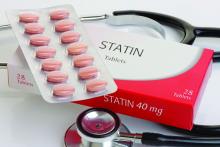Only half of adults with familial hypercholesterolemia are currently on statin therapy, with even fewer receiving a high-intensity statin, according to an analysis of data from the National Health and Nutrition Examination Survey.
“We found that 0.47% of the adult U.S. population has definite/probable FH [familial hypercholesterolemia] but observed a large disconnect between screening and treatment rates in adults with definite/ probable FH and adults with severe dyslipidemia,” wrote Emily Bucholz, MD, of Boston’s Children Hospital, and her colleagues in Circulation.
Dr. Bucholz and her team used detailed health information from the 1999-2014 National Health and Nutrition Examination Survey to collect a nationally representative sample of 42,471 patients aged 20 years or older, representing 212 million U.S. adults.The analysis found that 14 million adults, or almost 7%, in the population had severe dyslipidemia (LDL cholesterol of at least 190 mg/dL), and that 1 million of these adults, 7.2%, had definite or probable FH. Among the adults with FH, awareness and screening rates were above 80%, but those rates were only moderate among the general population. Adults who were likely to have FH were also more likely to be screened and be aware of hyperlipidemia than were those with only severe dyslipidemia.


